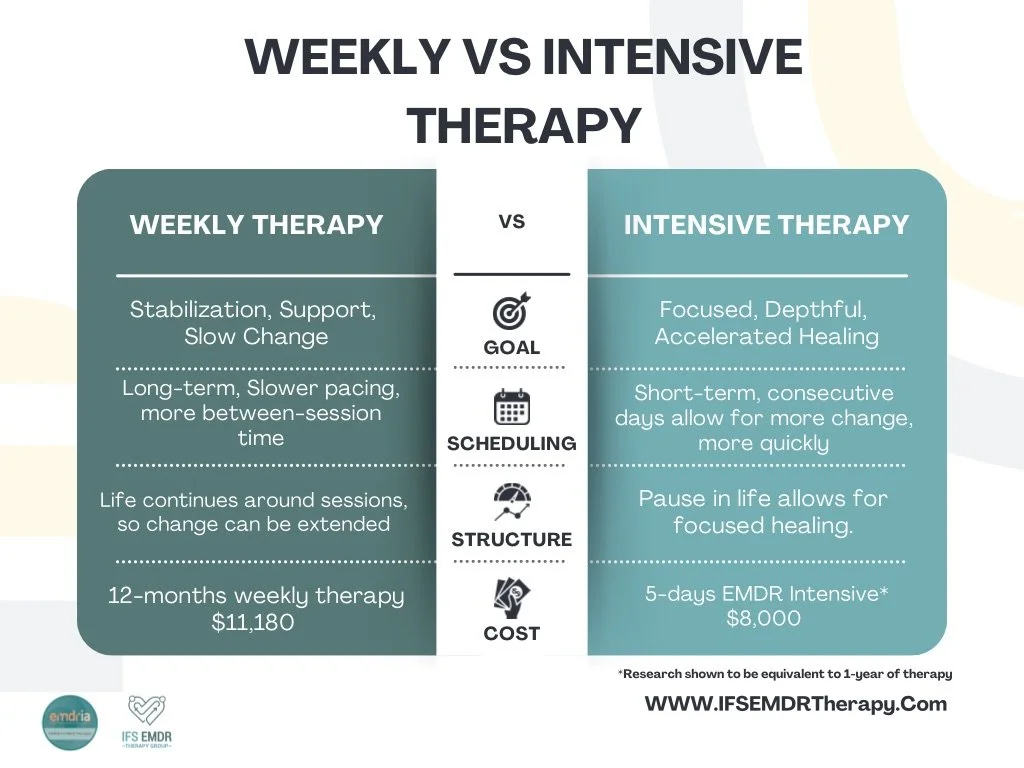How to Know If an EMDR Intensive Is Right for You
How to Know If an EMDR Intensive Is Right for You
Many people in therapy ask: “Am I ready for something more than weekly sessions?” If you’re feeling stuck, your nervous system is still activated, or you want a deeper shift — a 3-5 day EMDR Intensive might be the right next step.
What is an EMDR Intensive?
An EMDR intensive is a focused, immersive therapy format that condenses multiple longer sessions into a span of 3-5 consecutive days (or more, depending on your goals). During this time, you’ll engage in extended processing blocks rather than the standard weekly 50-minute format.
An EMDR intensive is a focused 3-5 day immersive therapy format that accelerates trauma resolution by delivering longer sessions and deeper processing in one block — ideal for those who feel stuck in
With the IFS-Informed EMDR approach we use, we integrate internal parts work, polyvagal resourcing, and somatic supports so your nervous system can track change more fully and reliably.
Who is a Good Fit?
You might be a good fit if you:
Have done weekly therapy and still feel stuck in a pattern or trauma loop
Are willing & able to step away from daily life commitments for 3-5 days (or commit to virtual intensive blocks)
Have a specific target (traumatic memory, relational pattern, chronic activation) you’re ready to dig into
Are in EMDR or IFS therapy currently in Trauma Processing stage (you already have stabilization/resourcing in place)
Want accelerated progress and are ready for deeper change
If you’re still early in stabilization or working through life-crisis logistics, you may benefit from preparing first (see next section).
Weekly Therapy vs. Intensive — Key Differences
Signs You’re Ready for an Intensive
You’ve been in therapy for a while but feel “stuck” or repeating the same pattern
You’re consistently triggered in ways that impact your daily functioning or relationships
You can carve out dedicated time (3-5 days) and have support/aftercare available
You feel a sense of urgency or readiness for deeper change
You’re interested in an immersive format, not just another weekly hour
How to Prepare for an EMDR Intensive
Stabilization & Resourcing
Before your intensive, make sure you have some grounding practices, nervous system regulation tools, and a support system in place. This makes the shift more stable and safe. If you have never done any EMDR or somatic trauma therapy, we offer a Stabilization + Resourcing Intensive to help you prepare for EMDR. This is particularly helpful for those with Complex PTSD (CPTSD).
Practical Logistics
Clear your schedule for the duration and ideally a build in 1-2 buffer days following your intensive.
Arrange childcare, work coverage, accommodations (if in-person)
Commit to rest, hydration, somatic practices between sessions
Emotional & Nervous System Readiness
Check in with your parts: Are you already working with protectors or stuck patterns?
Be honest about your willingness to feel and process what comes up
Be open to integration EMDR with a weekly therapy post-intensive (this is when change embeds and we help with referrals)
Questions to Ask Before You Book
Here are questions to help you vet a provider or format:
What experience do you have helping people like me?
What is your training and experience offering intensives?
What can I expect in an intensive with you?
What aftercare or follow-up is included?
Do you provide referrals for continued care or collaborate with my existing therapist?
How do you measure effectiveness or success with your intensive clients?
Summary & Next Step
If you’re reading this and something inside you says “Yes, this is time”, then you’re likely ready to explore an EMDR intensive. The next step is a free discovery call where we’ll assess readiness, clarify goals, and help you choose the format that aligns best with your life and nervous system.
Learn more about our EMDR Intensives: www.ifsemdrtherapy.com/emdr-intensives
FAQs: https://ifsemdrtherapy.com/faq
About the Author
This post was written by Morgan Levine, LCSW a licensed trauma therapist in Maryland, Washington DC, Virginia, Pennsylvania, and Colorado. Morgan is a Certified EMDR Therapist specializing in IFS-Informed EMDR and EMDR Intensives—including in-person immersive retreats and virtual multi-day formats.
She helps adults who feel “stuck” in therapy find deeper, lasting change by addressing the roots of perfectionism, overworking, anxiety, depression, PTSD, ADHD, obsessive or compulsive patterns, attachment wounds, and complex or single-incident trauma.
Learn more at ifsemdrtherapy.com/emdr-intensives.

